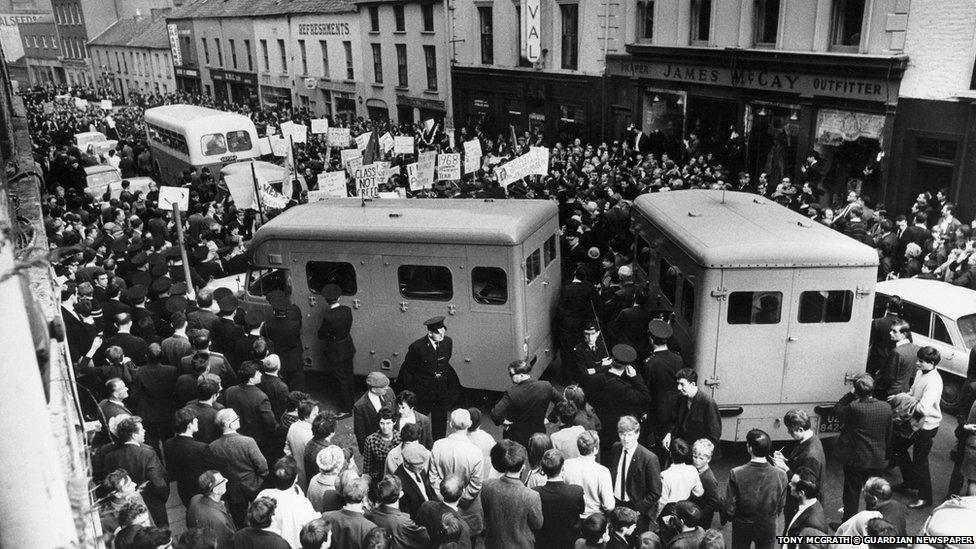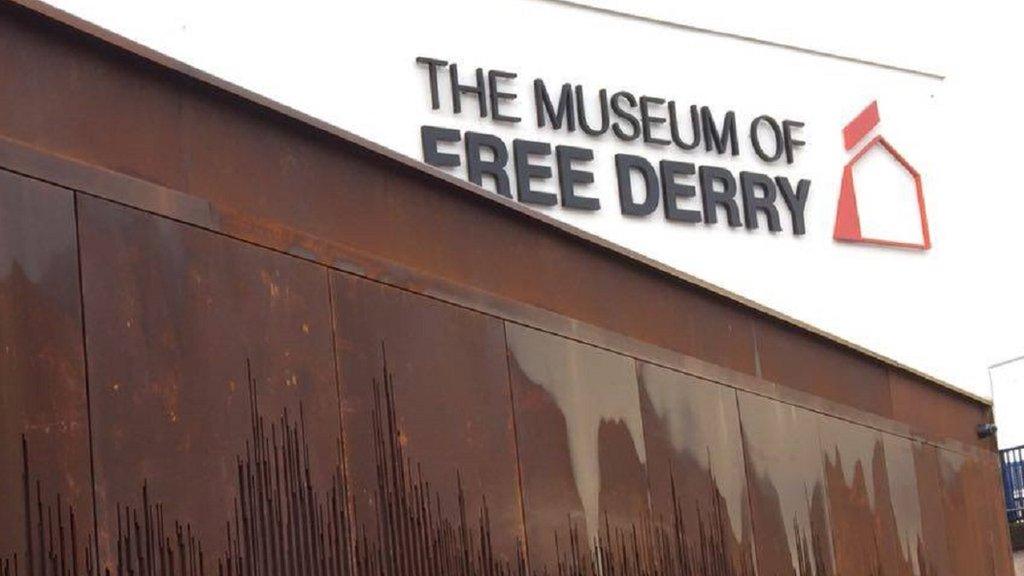'Dark tourism' booms at Northern Ireland's Troubles museums
- Published

Firearms feature prominently in Belfast's small Troubles museums
The tourism industry in Northern Ireland has been flourishing in recent years - visitors from around the world flock to the Giant's Causeway, Titanic Belfast and filming locations for TV series Game of Thrones.
But there's another side to the tourist trail. Troubles-related conflict tourism is booming as thousands queue up to visit places they've seen on TV or read about in books.
Dark tourism is the fashionable term - the desire to visit places worldwide which are linked to atrocities and tragedies.
In a new BBC Radio Ulster documentary, Telling Troubles Tales, Mark Carruthers investigates a phenomenon where little museums tell the story of the conflict through artefacts as simple as a handkerchief, and those involved in the Troubles speak of their own experience.

Mark interviews ex-prisoner Peadar Whelan at the republican plot in Milltown Cemetery, west Belfast
Mark says that before making the programme, he wasn't aware of the extent of this type of tourism.
"We've known about the black taxi tours in west Belfast for years, but I don't think people realise just how much Troubles-related tourism is available to visitors - and just how well-organised it is," he says.
"The walking tours and the museums are very professional - and they certainly don't pull any punches."

The Troubles still cast a long shadow with many opposing perspectives
One such museum is housed in the Roddy McCorley social club, external in west Belfast. It contains many of the artefacts you might expect to see, such as weapons, uniforms and medals, but you can also see a pair of Colonel Gaddafi's slippers, presented to a senior IRA man in the Libyan desert.
Chairperson Davy McGivern says it certainly offers something different from the Titanic:
"This is our story. Certainly there's another story - a British army story, an RUC story, there's loyalist stories - and all those stories are as relevant as ours," he says.
'Unheard voices'
Chris Armstrong , tourism development manager at the Eastside Partnership, says that for many years people in loyalist communities felt their voices were not being heard.
"I think it's really important to understand loyalism, even if it's just to provide a balance and a counter-narrative to the stories of the Troubles which are maybe told in other parts of the city," he says.

Billy Rowan from the Andy Tyrie Interpretive Centre
The Andy Tyrie Interpretive Centre, external on the Newtownards Road in east Belfast is named after a former leader of the Ulster Defence Association (UDA), a loyalist paramilitary group.
The UDA was the largest loyalist paramilitary organisation, external during the Troubles.
The interpretive centre's museum is run by former UDA man Billy Rowan, who is unapologetic about the number of weapons on display.
"You can't tell the terrorist story without the terrorist arsenal," he says.
Across the city, on the Shankill Road, an alternative loyalist view is on display at a small museum run by the former Ulster Volunteer Force (UVF) prisoners' organisation, EPIC, external.

Ex-prisoner Tom Roberts is a director of EPIC. Its museum reflects the UVF view of the Troubles
EPIC director Tom Roberts, himself a former prisoner, says tourists are keen to hear from people who were "at the coalface" of the conflict and how young men became involved with the paramilitaries:
"It is an uncomfortable story... people have forgotten the context and make judgements now on the basis of a relatively peaceful society that we have.
"They make judgements on how people became involved in conflict."
Ulster University academic Dr Peter Doak has been researching the possible benefits of so-called dark tourism.
He has been working with some of the history projects to help people tell their stories without re-traumatising those who underwent painful experiences.
It is not about preaching a "never again" message, he says, but considering the educational value of looking back at the dynamics of the conflict.
The Museum of Free Derry, external has developed into a major multimedia interactive project costing £2.4m, with more than 20,000 artefacts telling the story of the city between 1968 and 1972.

The exterior wall of the Museum of Free Derry displays a sound wave of the civil rights anthem 'We Shall Overcome'
Julieann Campbell is the museum's heritage and programmes co-ordinator. Her uncle, Jackie Duddy, was the first person killed on Bloody Sunday in January 1972.
The Army's Parachute Regiment opened fire on civil rights demonstrators in Londonderry, killing 13 people. A 14th person died later.
For all the hi-tech equipment, some of the most powerful connection with the past comes through seemingly innocuous artefacts.
One of these is the bloodstained handkerchief waved by Fr Edward Daly as bystanders attempted to carry Jackie Duddy to safety.
As Ms Campbell puts it "this simple piece of cloth is our number one artefact", and it was loaned to the museum by her family.

The bloodstained handkerchief waved by Fr Edward Daly on Bloody Sunday is one of the iconic artefacts held by the Free Derry Museum
Coiste is an organisation that organises walking tours in west Belfast.
Peadar Whelan is one of its guides. He served time for the attempted murder of a police officer and he is quite open about this when talking to tourists, even those who come from an opposing political perspective:
"We're quite happy and quite open to have the debate and the discussion.
"They might not like the answer but they're willing to accept it as our analysis of the conflict."
'Who's right? Who's wrong?'
Billy Rowan from the Andy Tyrie Centre agrees that there are several opposing perspectives on the Troubles:
"Who's right, who's wrong? We don't know because, at the end of the day, I can only tell the truth from the way I see it," he says.
Having interviewed this widespread group of people involved in presenting their views of our troubled past, Mark is convinced this is more than just a matter of political propaganda.
"There's very obviously a substantial and growing market for Troubles-related tourism here as we continue to grapple with the challenge of dealing with the legacy of the past - and some people I spoke to for the documentary clearly feel that conflict tourism might just have a positive part to play in that wider public debate," he says.
Mark Carruthers presents Telling Troubles Tales on BBC Radio Ulster at 12.30 GMT on Sunday 4 November.
- Published30 September 2018

- Published20 February 2017
